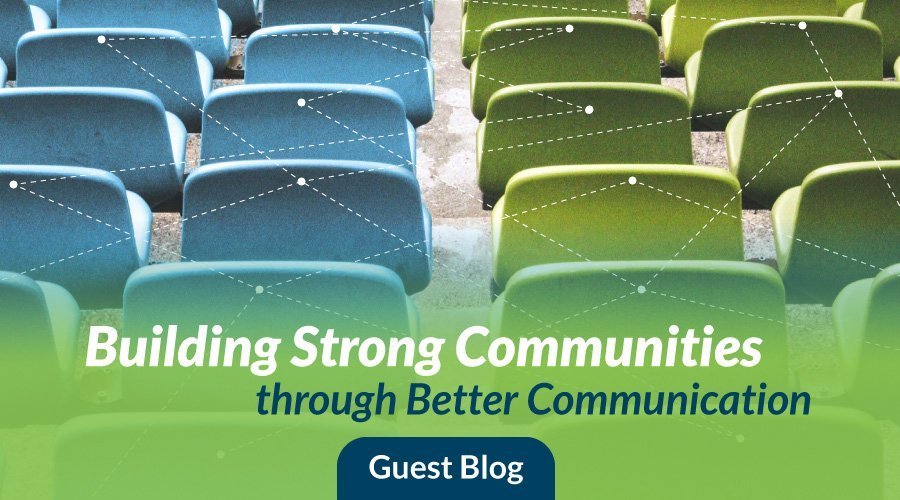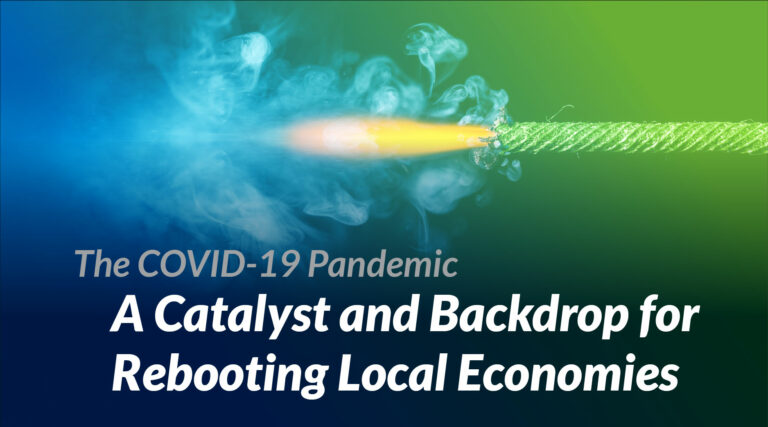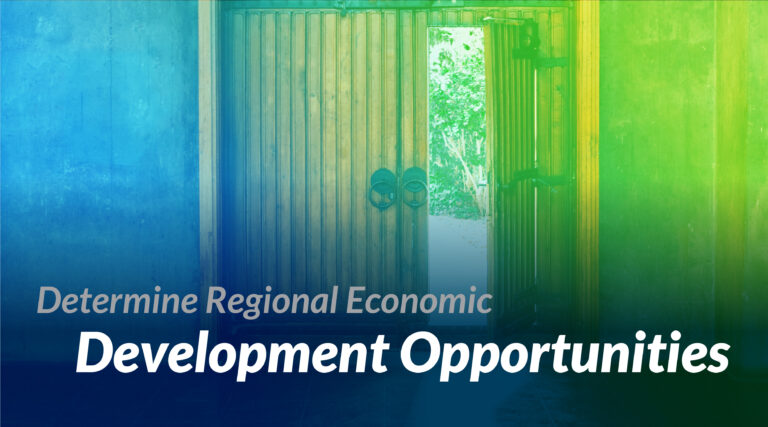As discussed in several other Prosperous Places blogs, respectfully listening to all sides of an issue and giving citizens an opportunity to express their opinions are cornerstones of good community and economic development. For example, when it comes to visioning there will be many different ideas about what “my” community should aspire to become. Some residents will have mainstream opinions from center field, while others will have ideas more from “left field”, but if citizens feel like they have been given a fair opportunity to express their views, they may be more likely to compromise.
The difference between communities that move forward and those that remain mired in disagreement often comes down to communications. As Melissa Wade and Liz Lundeen point out, listening to understand and not just to formulate a rebuttal can help lay a foundation for compromise and consensus. Differences of opinion are inevitable (after all, who would want to live in a Stepford Wives environment), but the way a community or organization treats disagreement can influence its future. Improving our communications skills is especially important in our national politically charged environment, and a good place to start is in our own communities.
Making Room for Productive Disagreement
by Melissa Wade and Liz Lundeen
Once upon a time, people could talk to each other. They could disagree and remain friends. Disagreement could even strengthen and deepen relationships. But many forms of disagreement were silenced by social norms and pressures that undercut mutual acceptance and respect. Disagreement became more personal, as people perceived difference as separating each other and comfort could be found interacting whenever possible with like-minded individuals.
 At the 2010 Washington “Rally to Restore Sanity,”¹ Jon Stewart made a compelling argument for recapturing our common humanity and mutual respect. He noted that driving down the highway, he was surrounded by Democrats and Republicans, Muslims and Christians, people of all types and beliefs. But they were all heading to work, or heading home to family, running errands, and meeting the everyday needs of modern life. We work together in almost all ways, but forget the common bonds because of our differences.
At the 2010 Washington “Rally to Restore Sanity,”¹ Jon Stewart made a compelling argument for recapturing our common humanity and mutual respect. He noted that driving down the highway, he was surrounded by Democrats and Republicans, Muslims and Christians, people of all types and beliefs. But they were all heading to work, or heading home to family, running errands, and meeting the everyday needs of modern life. We work together in almost all ways, but forget the common bonds because of our differences.
The inability to have a conversation across lines of difference is a widespread social problem with grave implications for the function of any group. Organizations dedicated to building community have an opportunity to address the crisis of engagement by making room for disagreement and ensuring that all voices and perspectives are included in conversations about education, health care, jobs, and growth.
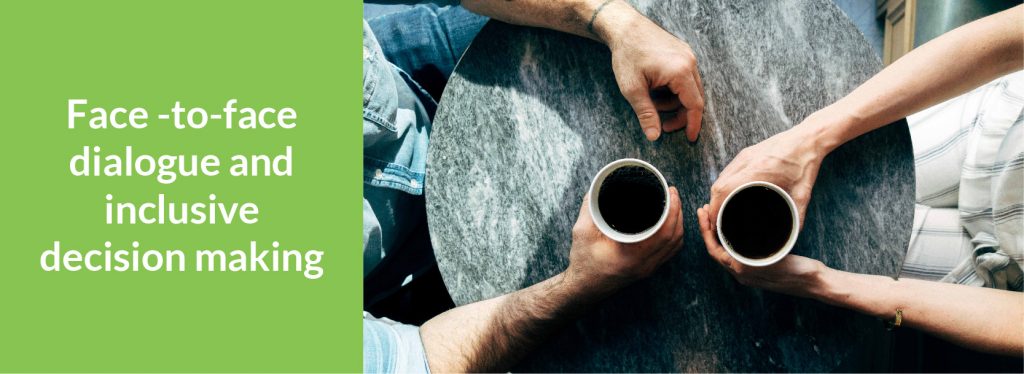 To achieve healthy discourse in this country, we need to start by building healthy communities where face-to-face dialogue and inclusive decision-making are commonplace. How much time is wasted when we don’t communicate? Business provides an example of the real cost of miscommunication.
To achieve healthy discourse in this country, we need to start by building healthy communities where face-to-face dialogue and inclusive decision-making are commonplace. How much time is wasted when we don’t communicate? Business provides an example of the real cost of miscommunication.
Approximately 70% of small and medium-sized businesses report that they regularly experience “communications pain” and spend an average of 17.5 hours per week addressing incidences of miscommunication in the workplace.²In addition to lost productivity, poor communications cost organizations quality employees who disengage or quit if they feel as though they are not listened to or valued at work. Employees invest in their work product and experience higher levels of motivation when their feedback is solicited regardless of their position in the organizational ladder. Cultivating an environment that encourages the open exchange of ideas contributes to a workplace culture of mutual respect where all voices and viewpoints are heard and everyone feels a part of the whole.³
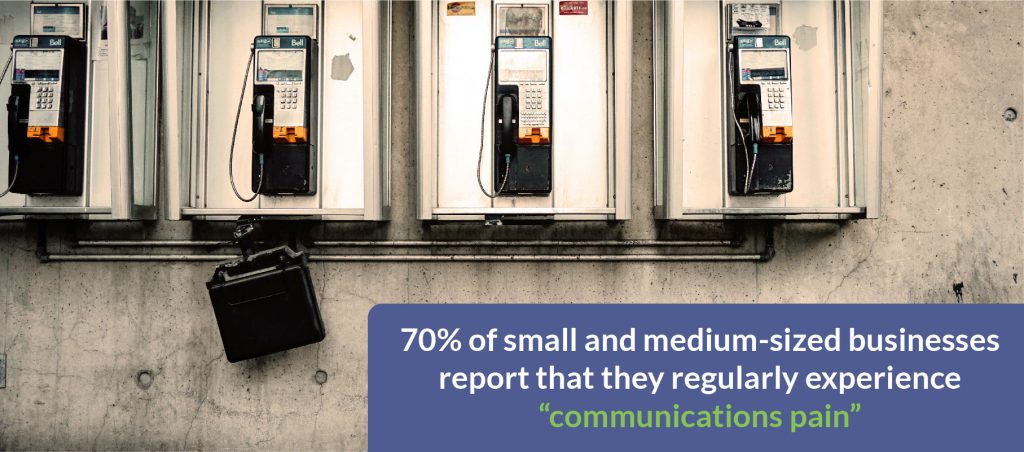
Organizational leaders testify that one way to achieve such a culture is to invite productive disagreement.⁴ Innovation and creativity are enhanced in teams that actively engage in task conflict and create space for negotiation between different viewpoints.⁵ Having employees debate the relative advantages and pitfalls of prospective projects can save time and money as a project’s fatal flaws are discovered before investing valuable resources.⁶ Leaders that embrace tension and regard differences of opinion as opportunities for growth and increased understanding find that their teams are more resilient and prepared to meet challenges head-on.⁷ Furthermore, learning how to do conflict well in a low-stakes environment builds an organization’s capacity for responding to conflict when it arises from external forces beyond its control.⁸
Despite these benefits, we know that organizations tend to avoid conflict and shy away from disagreement, likely because they do not have a process in place for encouraging members to disagree in a constructive manner or a strategy for considering alternative perspectives as a matter of routine. Our experience conducting productive disagreement workshops for organizations of all types has shown us that a little bit of practice goes a long way. Participants report that they had no idea how much they were listening to respond instead of listening to understand. After taking part in a moderated debate about the relative merits of two competing ideas, where sides are assigned to reduce the culture of fear, participants see the value of the process and are more willing to consider different viewpoints in their decision-making. Healthy communities are the result.

- Based on your experience, how can communities promote better communications and respectful exchange of ideas to promote community and economic development?
- Can you cite examples of good communications (transparency, listening to other points of view, working to reach consensus) helping with community and economic development? Or, where lack of good communication hindered community and economic development?
We look forward to your input. Have some thoughts to the questions and content above? Feel free to post them in the comments below.
In addition to posting your comments, feel free to respond to other postings. Just like the Janus Forum, this blog is a learning-by-sharing exercise.

ABOUT MELISSA WADE
Melissa Maxcy Wade is President of the Glenn Pelham Foundation for Debate Education, a non-profit entity founded to support the work of debate education in urban and international schools. She recently retired as Executive Director of Forensics at Emory University, and she was a founder and Executive Director of the Atlanta Urban Debate League. She has served on the board of directors of numerous national and international organizations devoted to debate and communications education including the National Debate Tournament and the International Debate Education Association. Ms. Wade is a political debate commentator for local, state, and national elections for various national media including the National Associated Press Presidential Debate Evaluation Panel.
 ABOUT LIZ LUNDEEN
ABOUT LIZ LUNDEEN
Liz Lundeen is the Director of Strategic Planning for the Glenn Pelham Foundation for Debate Education, a non-profit entity dedicated to leveling the playing field in education by supporting debate as an in-class and after-school program in socioeconomically challenged schools. Lundeen is an historian of educational inequality in the United States and has taught at the University of North Carolina at Chapel Hill and Hendrix College. Her work at the Pelham Foundation includes developing a highly interactive and customizable training program that teaches the value of productive disagreement to both mission-driven and profit-driven organizations.
Sources:
Source #1 – Full coverage of the rally
Source #2 – SIS International Research, “SMB Communications Pain Study White Paper: Uncovering the Hidden Cost of Communications Barriers and Latency,”
Source #3 – Emma Seppälä and Jennifer Stevenson, “In a Difficult Conversation, Listen More Than You Talk,” Harvard Business Review, 9 February 2017
Source #4 – Adam Bryant, “Want Clarity? Learn to Play Devil’s Advocate,” New York Times, 26 February 2011
Source #5 – Darko Lovric and Tomas Chamorro-Premuzic, “Too Much Harmony Can Kill Creativity,” Harvard Business Review, 28 June 2018
Source #6 – Gary Klein, “Performing a Project Premortem,” Harvard Business Review, September 2007
Source #7 – Amy Gallo, “Why We Should Be Disagreeing More at Work,” Harvard Business Review, 3 January 2018
Source #8 – Alan Fowler, Elizabeth Field, and Joseph McMahon, “The Upside of Conflict,” Stanford Social Innovation Review, Winter 2019
![2021 Prosperous Places Logo [TM]](https://www.prosperousplaces.org/wp-content/uploads/2021/02/20210205_JI_PPTM-Logo.png)
